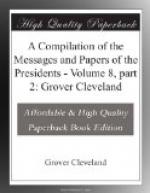WASHINGTON, February 18, 1851.
The PRESIDENT OF THE SENATE:
In addition to the papers already transmitted to the Senate in compliance with its resolution of the 28th ultimo, I have the honor herewith to transmit an additional report[9] from the Secretary of the Treasury.
MILLARD FILLMORE.
[Footnote 9: Relating to the seizure of the British ship Albion.]
EXECUTIVE DEPARTMENT, February 19, 1851.
To the Senate of the United States:
I have received the resolution of the Senate of the 18th instant, requesting me to lay before that body, if not incompatible with the public interest, any information I may possess in regard to an alleged recent case of a forcible resistance to the execution of the laws of the United States in the city of Boston, and to communicate to the Senate, under the above conditions, what means I have adopted to meet the occurrence, and whether in my opinion any additional legislation is necessary to meet the exigency of the case and to more vigorously execute existing laws.
The public newspapers contain an affidavit of Patrick Riley, a deputy marshal for the district of Massachusetts, setting forth the circumstances of the case, a copy of which affidavit is herewith communicated. Private and unofficial communications concur in establishing the main facts of this account, but no satisfactory official information has as yet been received; and in some important respects the accuracy of the account has been denied by persons whom it implicates. Nothing could be more unexpected than that such a gross violation of law, such a high-handed contempt of the authority of the United States, should be perpetrated by a band of lawless confederates at noonday in the city of Boston, and in the very temple of justice. I regard this flagitious proceeding as being a surprise not unattended by some degree of negligence; nor do I doubt that if any such act of violence had been apprehended thousands of the good citizens of Boston would have presented themselves voluntarily and promptly to prevent it. But the danger does not seem to have been timely made known or duly appreciated by those who were concerned in the execution of the process. In a community distinguished for its love of order and respect for the laws, among a people whose sentiment is liberty and law, and not liberty without law nor above the law, such an outrage could only be the result of sudden violence, unhappily too much unprepared for to be successfully resisted. It would be melancholy indeed if we were obliged to regard this outbreak against the constitutional and legal authority of the Government as proceeding from the general feeling of the people in a spot which is proverbially called “the Cradle of American Liberty.” Such, undoubtedly, is not the fact. It violates without question the general sentiment of the people of Boston and of a vast majority of the whole people of Massachusetts, as much as it violates the law, defies the authority of the Government, and disgraces those concerned in it, their aiders and abettors.




